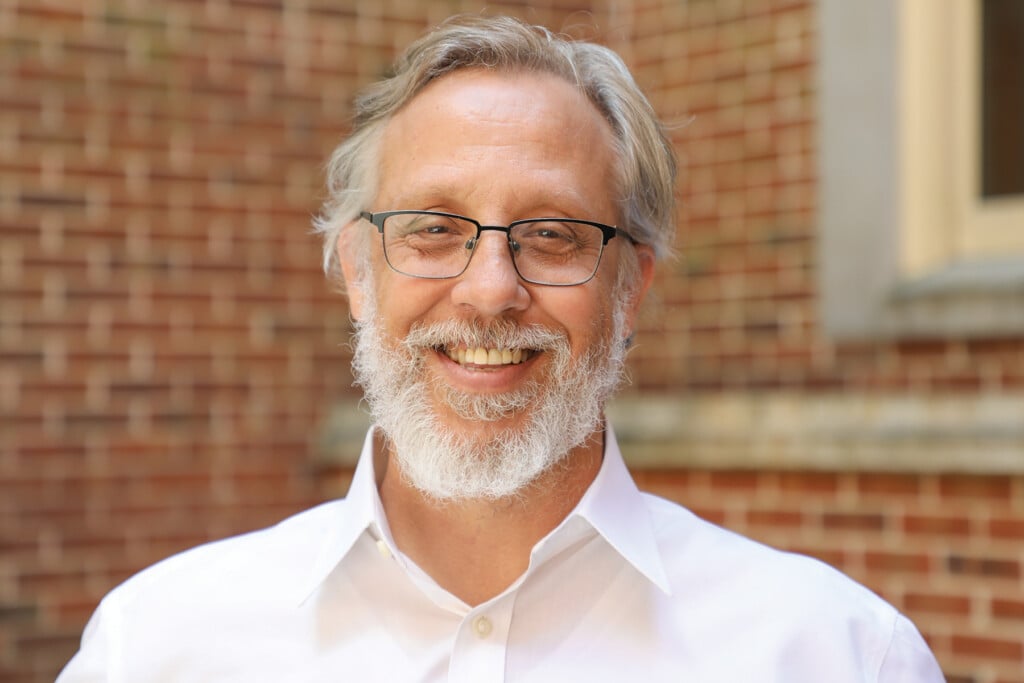Welcoming Words
Funny, romantic, and wise, FSU Professor James Kimbrell publishes his fourth collection of poems

To get to know poet and Professor James Kimbrell, it may be best to think of an analogy: Picture him as a multicolored quilt made up of educational patches, literary squares, pieces of sadness, and of great joy, love of music and art, and all stitched together by Kimbrell’s strong thread of curiosity and a talent for making his readers feel “warm” beneath his words and wit.
James Kimbrell, since 2000 a professor in FSU’s Department of English, has just published his fourth volume of poetry, The Law of Truly Large Numbers. Steeped, he says, in the territory of the Georgia mountains, where his father was born, and New Orleans, birthplace of his mother, Kimbrell says that “there is life and loss here—but always something to joke about.”
Like a template of middle America in the years after the Korean War, Kimbrell notes the influences of his parents: his father’s radiation poisoning and alcoholism following the military; his mother’s artistic sensibilities and work ethic; and the loss of a brother. And into this very middle-class setting—Kimbrell’s own fascination with ballet dancing, poetry, and, like a boy of his times, rock and roll.
“I ‘published’ my first poem at age 7, in the second grade,” he says. He also started his own literary magazine at Millsaps College, where he traded a trajectory toward law school for literature and later earned a master of arts degree from the University of Southern Mississippi, followed by a master of fine arts degree from the University of Virginia and a PhD from the University of Missouri. Kimbrell decided that he needed to see a little more of the world and spent two years teaching in South Korea before coming to Tallahassee’s Florida State University.
“And now every morning, I climb up to a dinky part of my home’s carport shed, filled with tools and my collection of old guitars, and I write. I couldn’t be happier. It’s actually the blank page that inspires me,” he says. “It is the best muse. I never know what I’m going to write. I simply work from the bottom up, waiting to see where the poem will take me.”
And from verses about stealing a warm sandwich and stuffing it in his pants to being starstruck when Kimbrell served ballet dancer Mikhail Baryshnikov at a diner where he once worked, to dozens of other tender and touching and laugh-out-loud works, Kimbrell continues to observe the world, looking for just the right words to emerge from another blank page.
An excerpt from
The Law of Truly Large Numbers:
Making a Turkey Sandwich
for Mikhail Baryshnikov
“It doesn’t matter how high you lift your
leg. The technique is about transparency,
simplicity and making an earnest attempt.”
—M.B., Baryshnikov at Work, 1978
Because he finally appeared during my shift
and I could see him beyond my prep window
and the cold display and the cash register
sitting at the four-top with Jessica Lange
and their daughter, Alexsandra, I made an earnest
attempt to slice the sunflower wheat bread
with disinterested grace, to keep the crust
unbroken before layering the smoked meat
with lettuce, mayo, avocado, and three strips
of applewood bacon, then cutting
the whole into halves, perfectly tooth-picked
gourmet doppelgangers of abundance and,
one hoped, restraint. Fingers hooked in my
apron collar, I watched as this table of three
who represented a ridiculously large share
of Earth’s talent and beauty were served
their sandwiches, or as I liked to think of them,
their edible sculptures. I did not walk out
to the forbidden gleaming customer area
to introduce myself, a fan, an aspiring poet,
a dishwasher and slicer of serious bread.
I was not the Baryshnikov of poetry.
I was not even the Baryshnikov of sandwiches.
And a family deserves to eat in peace, and I
deserved to watch them, or I didn’t, but watched
anyway, though not ostentatiously. It wasn’t
easy to slice a fresh round of focaccia
when I wanted to set forth in my hair-net
and scream “Mikhail! Mikhail! I’m so happy
you got free from nasty old Russia where a 5’5” male
could never dance the lead!” In my salty halo,
in my cloud of bread steam, I recalled
childhood visions of an airborne jeté
over pool halls and pine-tops, the water tower
a train set figurine in the air beneath me.
Of course, like most boys in Mississippi,
I was herded decidedly away from ballet
toward football, hunting. I wonder, how many
poets are would-be dancers? Name one
good poem that doesn’t long for escape.
After they finished, napkins on plates,
Baryshnikov’s crumbs were everyday crumbs.
Nor was the silverware infected with
greatness. Such are the mysteries of genius
and mastication. The oven bell rang, as did
the order bell and the dish bell, all the bells
that said the meal is ready, and the cake. Still,
with damp cloth and bucket, I stepped out
and took my time clearing their table.
—James Kimbrell

